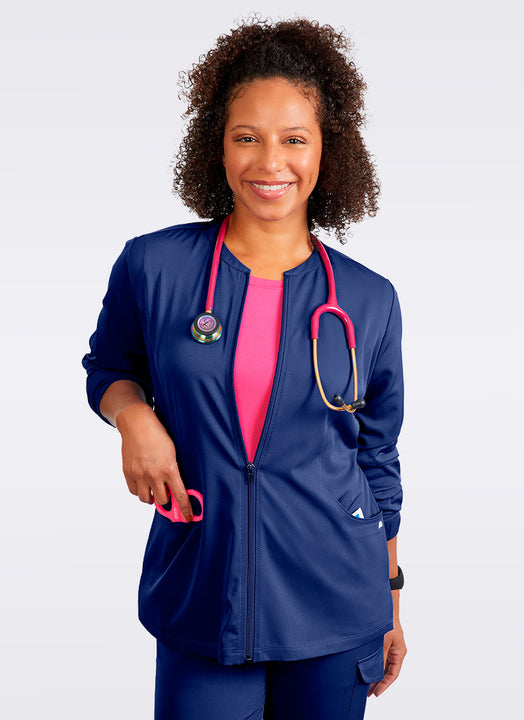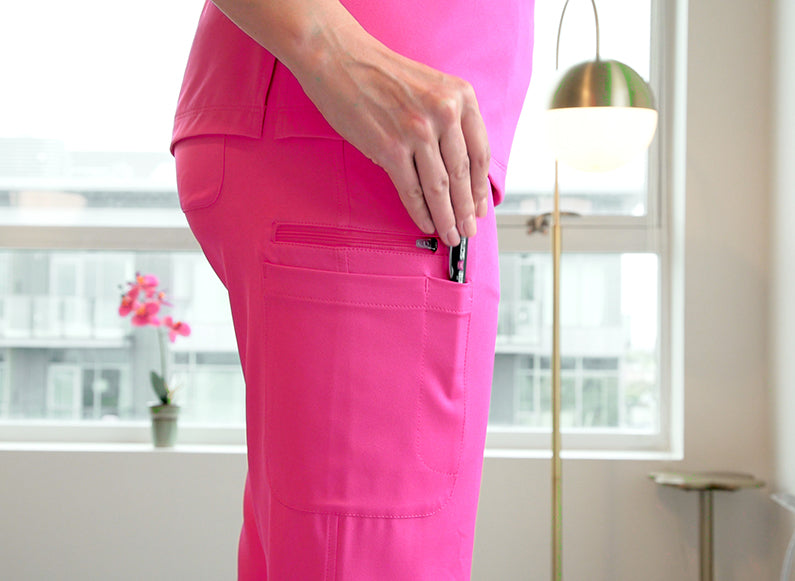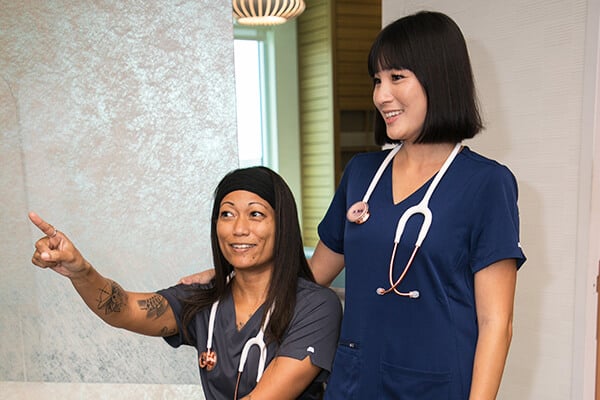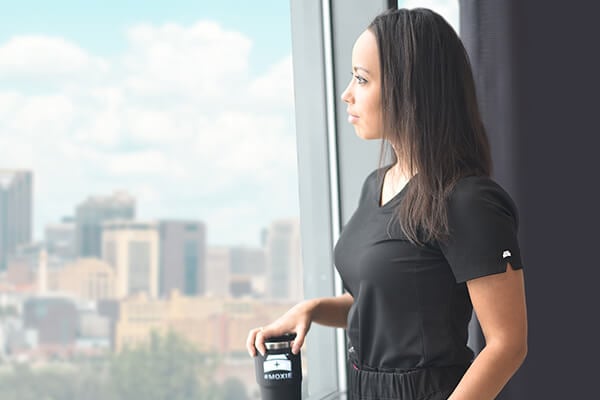Written by Trish Wiseman, BSN, RN
"There's a Pandemic, and I'm Not a Real Nurse Anymore."
Red marks on faces and bruised noses peppered my social media feed, posted by frontline healthcare workers who were thrust into the middle of a biological war zone. Personal protective equipment personal protection equipment ( PPE ) like masks and eyewear would have been wasted on me because my patients were virtual, not in a bed in front of me.
My friends from the hospital were living apart from their children, unsure of the consequences of a hug or a kiss. They weren't staying in the same home as their partner for fear of infecting their own household with a virus that was terrifying the world. One friend had even moved into a travel trailer in her backyard instead of living in her own home.
What's happening? How long will this last? Will I be asked to help? As a single mom without a partner, will I be forced to keep my kids safe by staying away from them if I go back to the clinical setting?
My mind was on fire. My kids were safe because I worked from home. I was safe because my work no longer required me to physically care for my patients. Yet, the guilt that came from being away from the bedside only allowed for a few fitful hours of sleep each night. The unknown loomed over me, threatening to put my little family at risk.
And there I was, sitting in my warm and cozy home office. I enjoyed the usual daily banter with my coworkers. Meetings were held on camera where I could wear my pajama pants as long as I had on an acceptable shirt instead of my medical scrubs . I didn't even need to brush my teeth. Sometimes I didn't even brush my hair.
I had my kids tucked in safely beside me, taking their classes from home. We ordered our groceries and picked them up. Our typically full calendar of events fell empty, and all activities were canceled. We watched 80's movies every night while we ate dinner sitting on my bed. The early days of the pandemic for us actually gave us time together, which we hadn't experienced to that level in years. At the same time there was a nagging sadness and sense of anxiety in the back of my mind because I knew that many of my friends and colleagues weren't that lucky.
It took me months to come to terms with the fact that I felt unimportant and unable to assist where it seemed assistance was needed most. Nurses want to feel useful, work hard, and fulfill what they believe to be the requirements of their calling. It’s imperative for nurses to recognize and acknowledge guilt that arises from working in nursing jobs that are away from direct patient care. Nurses are essential providers in many important roles that do not always require direct patient care. Nurses everywhere seem to be contemplating what their work means to them and others during Covid-19.
Sitting in an Office Chair is a Sign of Weakness
Taking care of my patients consisted of chart review, data entry, and using my critical thinking skills without the added fatigue on my entire body. I felt… less than. Guilt consumed me. As a nurse with more than 22 years of experience, I consider myself a veteran of the healthcare field in some of the less-comfortable conditions.
I started in the emergency department straight out of nursing school. Over the years, I have also worked in family medicine, thoracic and cardiovascular surgery, homecare, and long-term acute care. A number of years had me embedded in critical care units, taking rounds with an entire treatment team, assessing, vetting, and working with some of the sickest people I had ever seen. I understand that I had paid my dues and contributed in many ways.
Somehow, I had gotten lucky and had moved to a position away from the bedside about a year before the pandemic hit. My position is a bit difficult for people to understand at times, especially for people who don't work in the medical field. I've had so many friends and family members, as well as former colleagues, say to me, "so, you're not a nurse anymore?" It's like being stabbed in the heart with a thousand tiny needles.
As a Utilization Management nurse, I work for a health plan, or what many know as a medical insurance company. I review requests from physicians and facilities regarding recommended:
-
Specific surgeries or procedures
-
Equipment
-
Intensive behavioral health treatment
-
Inpatient hospital stays
-
Any other recommended procedures or treatments
With each of these requests, it is my responsibility to ensure that very specific criteria are met that align with best practices and industry standards. I use my 20 years of experience to review medically complex cases, and I genuinely believe that my multi-faceted nursing background allows me to serve my patients in the best way possible by advocating behind the scenes.
Is that enough? Am I doing important work? Sitting down in my office chair each day at the beginning of the COVID-19 pandemic felt like a luxury when I should be doing much more. There was a time when I received a phone call from the human resources department of my health system. They were screening non-clinical nurses for potential return to the bedside if such a need arose. None of the nurses in my company were called forward. The rationale from our leadership was that in our current positions, my colleagues and I were imperative in moving appropriate patients through the continuum of care, and opening up critical beds in the acute care hospital for those who needed it most.
That's when it hit me - I. AM. IMPORTANT. Even now, from my desk chair.
Looking back, I have been able to identify the processes I followed in to work towards this conclusion:
-
Acknowledgment
-
Self-reflection
-
Focus on gratitude and positivity
Research has demonstrated that nurses working throughout the COVID-19 pandemic have difficulty working through their emotions. This is critical information that employers must utilize to help support the needs of the nursing workforce.
But WAIT! Behind-the-Scenes Care is Just as Important!
I have sincerely realized that my job is like no other. My patients need me as much as they need their bedside nurse, the nurse in their primary care physician's office, and the nurse who screens them before their outpatient surgeries. All of these nurses have a complex responsibility to effectively play their role in the whole healthcare continuum. We ALL have a role, no matter how hands-on.
These patients need me to do what I do, advocate for them behind the scenes, and allow for the best and most appropriate care during their health challenges. I successfully discovered ways to work through feelings of inadequacy and "not being a real nurse anymore" when my nursing job moved me away from the bedside.
Finding confidence in what can be and is done by nurses away from the bedside means making an equal impact on patients' continuity of care.
About the Author:
Trisha Wiseman, BSN, RN is a registered nurse, and a 27-year veteran of the medical field, who considers herself a life-long learner. She has found a passion for educating the masses in public health, and has done so her entire nursing career. She was nurse of the year for her division in 2012, for a health system of 8,000+ caregivers. She has a background as a Certified Pharmacy Tech in inpatient and outpatient pharmacy, as well as a nurse in emergency medicine, family practice, cardiovascular and thoracic surgery, home care, long term acute care (LTACH), case management, and utilization management. When she’s not writing, she’s not working, she’s providing the best taxi service around to her two fantastic kids, and drinking coffee around the clock!
Diana Jacket

$44.99
DESCRIPTION The Diana Jacket is the PERFECT lightweight layer that gets you to work on a chilly morning and adds the just-what-you-need warmth at 2am. Smooth and clean front lines with Princess seams curve with you in all the right… read more
Resources:
Jackson D, Bradbury-Jones C, Baptiste D, et al. Life in the pandemic: Some reflections on nursing in the context of COVID-19. J Clin Nurs. 2020;29(13-14):2041-2043. doi:10.1111/jocn.15257
Hossain F, Clatty A. Self-care strategies in response to nurses’ moral injury during COVID-19 pandemic. Nursing Ethics. 2021;28(1):23-32. doi: 10.1177/0969733020961825




